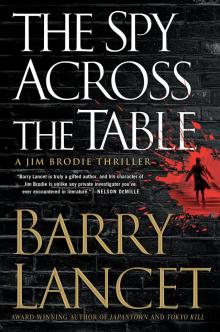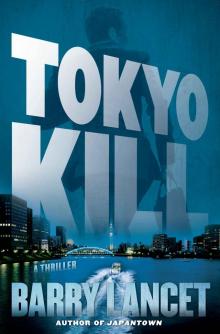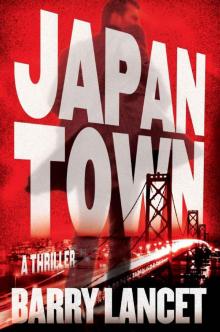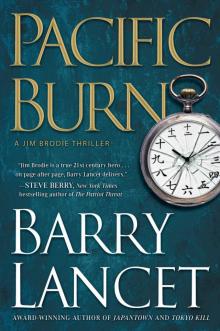- Home
- Barry Lancet
Tokyo Kill Page 2
Tokyo Kill Read online
Page 2
Noda shrugged. “Could be.”
“And?”
“Tricky.”
Frustratingly curt as usual.
Miura looked from Noda to me. “So you’ll take the case?”
“Noda?”
He shrugged. “It’s what we do.”
Meaning Brodie Security had handled Triad cases before. That was the question I’d really been asking. I was still new to my father’s outfit, having inherited half of the firm just eleven months ago. But showing my ignorance in front of a client was not an option.
“Okay,” I said. “We can look into it. My father’s people are very good at what they do.”
“They’ll need to be,” Miura said, his eyes lingering on Noda with vague apprehension.
“How many men from your old squad are left?”
“Twenty-eight of us survived the war but most died long ago. Only seven showed up at our last get-together. Then Mitsumoto died of a brain aneurysm, and Yanaguchi caught the bird flu on a visit back to Anli last year. Before the home invasions there were five of us.”
So only three remained.
“Where are the other two?”
“One left for a friend’s vacation home in Kyushu. He won’t tell me where. The other went to stay with his son in the countryside.”
Noda and I exchanged a look. That the remaining members of Miura’s troop had fled Tokyo—and one to the farthest western island of mainland Japan—bolstered the old soldier’s claim.
I had a last question:
“If you ruled Anli-dong with an even hand, then why would someone want you and your men dead after all this time?”
He sighed. “It’s the dirt. Whenever higher-ups came through they expected to be entertained. They invariably ordered us to ‘weed out traitors’ and ‘set up inspections.’ The first consisted of lining up any villagers in jail for target practice. The second involved examining local beauties in private. These were orders we couldn’t refuse or they’d—”
“—put a bullet in your head.”
Miura’s shoulders sagged under an old guilt. “Without a second thought.”
“I see.”
“After the first VIP visit, the Triads threatened me. I told them I could only control those under my command, not above. They were unconvinced. ‘If you wear the master’s uniform, you can bleed for him too.’ They didn’t act then because they knew more villagers would suffer if any soldiers were attacked. But they told me they would come one day.
“Years later, when China finally allowed Japanese tourists into the country, a handful of us went back. We looked up the families we knew. We were shocked to see how poor they were, and still are today. We’ve returned many times, bringing them money and modern appliances like Japanese rice cookers. We ate together and drank together. We did what we could to make amends. But we couldn’t help everyone. I think our trips triggered an old resentment. We gave out our addresses freely. That may have been a mistake.”
Noda grunted. “Revenge slayings.”
Miura concurred with a nod. “My future killer is in Tokyo, Brodiesan. I can feel it.”
* * *
A team of six men escorted Akira Miura home.
Once they arrived, two would canvass the neighborhood, then the local shops. Two others would secure the residence. Windows, doors, and other exterior access points would be sealed, then house, garage, and yard scanned for listening, tracking, and incendiary devices. The last pair would work with Miura on safety protocol, including an emergency evacuation plan, after which they would spend the next twelve hours with their charge until two rested operatives replaced them.
However, before the team left Brodie Security, they gathered in the conference room with the Miuras to discuss procedure. Sometime during the proceedings, the son slipped away and cornered Noda and me in my office.
“Thank you for indulging the old man,” he said. “The murders have rattled him, but to be frank, we are seeing signs of senility lately, and mild paranoia.”
“Has he gone overboard before?” I asked.
“No, but the doctors told us to expect a slow degeneration.”
Noda and I traded a glance.
“Noted,” I said. “But we’ll want to treat the threat seriously until we can prove otherwise.”
Yoji Miura remained skeptical. “Your presence will comfort my father, so what could it hurt? But between us, you’ll be babysitting.”
Noda scowled. “Two men murdered is beyond babysitting.”
The head detective’s voice was low and menacing. Yoji looked startled until he noticed that Noda’s rage was not directed at him but at what might or might not be out there, lying in wait. Even so, when the younger Miura left my office, he gave Noda a wide berth. The detective himself followed a minute later, mumbling about clueless offspring.
Alone, I leaned back in my chair and stared at the ceiling. Deep down, something primal stirred, disturbed by the undertow of Miura Senior’s fears. I liked the old veteran a lot. Pulling out his musty suit for the visit. Habitually shaving three years off his age so he could still attract “the ladies.”
What I didn’t like was his fellow veterans abandoning Tokyo for safer grounds. Nor the triple threat—home invasions, Triads, and old war atrocities. I’d been through a lot in my life. Seen a lot. Had learned the hard way to give any early sign of danger its due.
This could be the world’s wildest goose chase, or the beginning of something very nasty.
CHAPTER 3
THERE must have been something in the air because trouble kept coming. First London, then Tokyo.
“Rang ’round and roused an amateur,” Graham Whittinghill, the British dealer, said when we reconnected. “Afraid we had a bit of a barney.”
My hand gripped the headset tighter. This was not the kind of news I wanted to hear. Graham meant that he and a competing dealer, an amateur in the field of Japanese art, had exchanged some territorial hostilities. At times you need to reach beyond your personal network. Sometimes people you hope you can trust seek to insert themselves into a deal by trying to grab the work first and forcing you to feed one more middleman.
“Happens,” I said.
“Deepest apologies. The bugger’s turned dodgy. Fed me a load of codswallop.”
“Codswallop being crap?”
“Of the grandest order,” my British friend said. “I’ll give it a sort-out tonight.”
We’d met four years ago through a mutual acquaintance and hit it off immediately. Graham was tall and lanky, with dirty-blond hair and a gleam in his eye. My expertise lay with Japanese art, his with Chinese. I needed a trustworthy source because the Chinese art market was a nightmarish maze of top-end counterfeits that could dupe ninety-five percent of the people. Fortunately, the painfully shy Graham was among the remaining five.
I said, “Refresh my memory. Do you know your way around Japanese ink painting at all?”
No one could call Sengai a brilliant brush-meister, but the Zen monk excelled in taking the Japanese love of simplicity to a very human place. His pieces were humorous, playful, and, at their peak, profound. Sengai laughed at life. He commiserated with those of his flock trapped in the workaday grind, but reveled in the bigger picture—that existence is impermanent. Enlightenment had brought him freedom and joy, and his brush danced with the knowledge.
“No, purely Chinese for me, with the singular exception of Chinese themes in Japanese works, which by happy coincidence happens to include depictions of Chinese Buddhist monks in Sengai’s oeuvre.”
“Really? Why?”
“A dollop of juicy gossip from the far side of the moon. It will hold until you next drop around for a pint. We have a more pressing issue at hand.”
“Fair enough. Then let’s wrap it up before our rogue dealer sinks the whole venture. Get a peek at any documents, then lock down the owner for a videoconference so I can do an on-screen evaluation.”
“Certainly. As I’ve tainted the undertaking, perhaps we
should knock down my commission to half the usual?”
“Wouldn’t think of it,” I said.
“You are a gentleman, sir, but I’ll leave the offer on the table.”
“Won’t change my mind.”
In the extended silence, Graham’s appreciation was palpable.
“By the bye,” he said a moment later, “since it’s come up, should you ever happen across one of Sengai’s renderings of a Chinese monk, ring me straight away, any time of the day or night.”
“And you mention this because?”
“ ‘You never see one carrot-fly but you see three.’ Farmer’s wisdom courtesy of my Cornish grandfather.”
And that’s where we left it—with vermin buzzing and trouble brewing.
The next blow came in low and mean and caught me looking.
CHAPTER 4
WHEN I picked up my six-year-old daughter at the place of an old family friend, I found her fed, bathed, and played out. Once home, Jenny requested a bedtime story. I obliged but she faded by the third page. In Tokyo, “home” meant my father’s comfy bungalow, which served double duty as city lodgings during my visits and, occasionally, as a safe house for clients now that Brodie Security held the deed.
Our current trip was designed as a reprieve after the nerve-wrenching ride of Japantown. My plan called for quick stops in Tokyo and Kyoto, where I’d choose some pieces for the shop, then Jenny and I would shift into full vacation mode. I intended to hand over the Miura job to Noda tomorrow or the next day.
A Suntory whiskey at my side, I sank into the family room sofa to map out the details of our visit to Kyoto, but I didn’t get far. Intruding on my thoughts time and again were Jun Hamada’s final words:
“What’s the bottom line?” he’d asked during a last huddle at Brodie Security.
“To catch whoever killed Miura’s buddies,” I said.
Hamada, our office expert on Chinese crime gangs, hesitated. “May not be possible if we’re talking Triads.”
“Why not?”
“They’re like ants. You only see one or two at first, but if you prod the nest they swarm.”
“That doesn’t sound good.”
His bulbous nose twitched. A hardened ex-cop out of Osaka, Hamada had been through his share of battles. “You got that more right than you know.”
In a distracted state of mind, I carried on late into the night. Hamada’s words lingered. I polished off my third whiskey. Smooth though the aged liquor was, it did nothing to kill the sourness building in my gut.
Around midnight, I started entertaining thoughts of sleep. Which is when Inspector Shin’ichi Kato of the Tokyo Metropolitan Police Department rang me on my private cell phone—and elevated Hamada to house psychic.
DAY 2
THE ECHO OF WAR
CHAPTER 5
12:17 A.M.
AT the knock I opened the door to Officer Rie Hoshino, one of Tokyo’s rare policewomen.
“Brodie-sama?” she asked in formal Japanese.
“Yes.”
“You spoke with Inspector Kato?”
I nodded. “He told me to expect you, though not so soon.”
Inspector Kato’s protégée wore rouge and eye shadow; both were tastefully applied and kept to a minimum, no doubt to allow her to blend more easily into the boys’ club that was the Tokyo MPD. Her uniform was the requisite navy-blue jacket and pants, a sky-blue shirt, and dark tie under a wide, pointed collar. Brass buttons locked down the image, which, with minor variations, echoed that of her male colleagues. Her clear brown eyes were penetrating and her complexion youthful.
“Are you ready?” She gave me a polite smile, her tone all business.
“As ready as I’ll ever be. You bring the sitter?”
Hoshino waved and a fresh-faced female recruit stepped into view. “This is Kawakami. Unmarried but the eldest of five children. Will she do?”
Kawakami bowed. “Don’t worry about a thing, Brodie-sama. Your daughter will be well looked after. What’s her name?”
“Jenny, but she also answers to Yumiko. Her middle name. My cell number’s on the table. Call if she wakes up and you can’t calm her. She . . . gets frightened sometimes.”
With one parent dead, Jenny’s radar lit up whenever I stepped too far from her sight. A kid’s-eye view of single-parent status could be terrifying.
Kawakami acknowledged my instructions with a second bow and Hoshino glanced at her watch. “If we’re good, then please follow me. Time is short.”
She led me to a waiting patrol car. “Rear seat, if you don’t mind. Protocol.”
Once we left the narrow residential lanes, Hoshino’s foot hit the pedal. She flicked on the rotating red strobes on the roof of her squad car, and we wove in and around a smattering of slower-moving traffic.
Hoshino caught my eye in the mirror. “You okay back there?”
“Fine. Where’d you pick up the precision driving?”
“My father taught me a few tricks after I insisted his daughter could also handle the road.”
“Also?”
“I have two brothers.”
“How’d you do?”
“Faster and better.”
We rolled on in silence until I said, “Where we headed?”
“Kabukicho.”
A chill slid down my spine. Kabukicho wasn’t as lawless as rumors made it out to be, but neither was it harmless. Violence in the quarter erupted in cycles, and when a breakout occurred it could be lethal.
“This time of night, that can’t be good.”
“The inspector wishes to fill you in himself.”
“Serious, then?”
Resolute cocoa brown eyes flashed me a look: she wasn’t that easy.
I tried a different tact. “Do you like working for Kato?”
The next instant she rocketed the car around a corner with only a whisper of rubber, then met my gaze in the rearview and said yes.
“And police work?”
“I was born to it. Father, grandfather, both brothers joined the force.”
“First woman?”
“Yes.”
“I wonder—”
“Excuse me a second,” she said, and gave a short blast of the siren, sending two doddering taxis scurrying to the side of the road like startled cockroaches.
Hoshino found me in her mirror again. “You were saying?”
“Were you in Kato’s unit last fall?”
She swung into another turn, came out of it, and accelerated. “When you and he, uh, worked together? No.”
“So you don’t know what happened?”
“I didn’t say that.”
She knew.
We charged into the tunnel that ran under the tracks north of Shinjuku station, turned left, then raced past the terminal station of the Seibu–Shinjuku Line.
The streets came to life.
We had arrived.
CHAPTER 6
WE were on the edge of Tokyo’s biggest adult playground.
Overhead, stacked neon signs in kanji characters jutted out from the upper stories of wafer-thin buildings. A river of light in red and blue and green washed over the windshield. Revelers wobbled down both sides of the street, talking in overloud tones, faces flushed with drink.
“A lot of people for a Thursday,” I said.
“Getting a jump on the weekend.”
Except for a handful of pachinko parlors, movie houses, eateries, and karaoke venues, the district slept through the day. But after nightfall thousands passed through its izakaya drinking spots, noodle shops, and pricey Japanese “snack bars” with attractive hostesses attached who would giggle and stroke male egos for the right price. Host bars did the same for females willing to drop some bills.
Our progress slowed to a crawl as we eased deeper into the backstreets, where the sex trade thrived. Love hotels and live shows entered the mix. As did touts for strip joints and no-panty clubs. Hookers hovered in the shadows.
Hoshino finessed the
nose of the vehicle into a slender alley. The neon glow faded. Shadows crawled down the backsides of buildings. Up ahead the headlights captured the rear of a second black-and-white. Yellow crime scene tape stretched from one wall to the other with unarguable authority.
When Hoshino cut the engine, darkness swept in.
* * *
“Glad to see you’re still among the living, Brodie.” Inspector Kato extended his hand and we shook.
As I’d stepped from the car, he had emerged out of the night, dipping smoothly under the crime tape.
“What I can’t understand is why they still let you carry a badge.”
White teeth grinned from a dark face. “Who can?”
We’d met eleven months earlier over the Rikyu affair. At the time I’d been a suspect, not a friend. Kato had walnut-colored skin and wrinkles at the corner of his eyes and mouth. Outwardly, he was a bundle of disarray. No matter how well groomed he began the day, halfway through his shift he would look as though he’d been bodily ejected from an oversize clothes dryer. His attire—tonight a black trench coat and gray suit—was rumpled, and his silver hair resembled a haystack the wind had had its way with. But despite the exterior disorder, he was serenity itself. Nothing ruffled his internal meter. Before following his father into the MPD, the disheveled inspector had trained as a Buddhist monk.
Kato took a stab at deciphering my wardrobe. “Early James Dean?”
I’d thrown on dark jeans, a black T-shirt, and a black leather jacket. My clothing sensibilities would never earn me a call from one of Tokyo’s hallowed fashion gurus, but I’d learned long ago that dark colors worked well with my wavy black hair and blue eyes, not to mention my ability to blend in when it came to dark alleys.

 The Spy Across the Table
The Spy Across the Table Tokyo Kill
Tokyo Kill Japantown
Japantown Pacific Burn
Pacific Burn